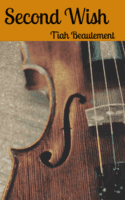Nqobi usually found her errands simple to complete: drop off letters at the post office, perhaps pass some sealed messages to a few neighbours. And – usually the biggest part of her errands – fetching tiny brown envelopes, which bulged at the seams, from businesses and families that occupied her step-father’s properties.
This was how Nqobi came to be at Second Wish, which sold items that once had belonged to someone else, but no longer did.
“Good morning, child,” said Mr Gwentshe, the owner.
“Good morning, Mr Gwentshe,” Nqobi replied.
She approached the counter where he sat, but before she reached it, something caught her eye. It was a violin, an instrument she had only seen on her step-father’s television. It was battered and scarred, yet to her it was a thing of beauty. “Wow,” she breathed.
Her heart yearned for it in a way she had never experienced before. Such things were not for her, however. Her mother had so little money as it was, and had to pay for food, clothing, and home-schooling supplies. It would be selfish to ask for more.
Nor would her step-father ever pay for such a thing. She had made the mistake of asking him for shoelaces once, when her mother did not have the money to buy them. The man had been very angry. “I give you and your mother my valuable time!” he had exploded. “A roof over your heads, and a place to sleep. What more could any child ask of a man who is not her father? You insult my generosity.”
No, it would not do to want such a thing. So Nqobi tore her eyes from the instrument, and turned her attention to the owner of Second Wish.
Mr Gwentshe put his hand in his pocket to remove a small brown envelope and handed it over to the child.
“Enkosi,” she said.
As she turned away, her eyes strayed back to the violin.
Mr Gwentshe sighed. Now understand, he was a hardworking man, and the amount of money and favours the child’s step-father demanded of him grew every month. First it was the rent. Then it was for information on customers. There was the ‘protection fee’, which was constantly rising and if one did not pay, then the shop owner would find themselves robbed, or worse.
But Mr Gwentshe knew this child had done him no wrong. He had also known her poor mother since she was a child, and had seen how she’d suffered due to Sompisi. Now the child was hurting too, all because of that wicked man.
A gentle breeze blew into Mr Gwentshe’s ear. ‘Give it to her,’ it said.
“Wait, child,” he said, standing up. “You have forgotten something.”
Nqobi turned.
“Your gift,” he said. He took down the violin and its bow, placed it in a case, and put it into her arms. “I hope you enjoy.”
***
Tell us: Do you think this gift will be a good thing, or bring trouble, and why?


